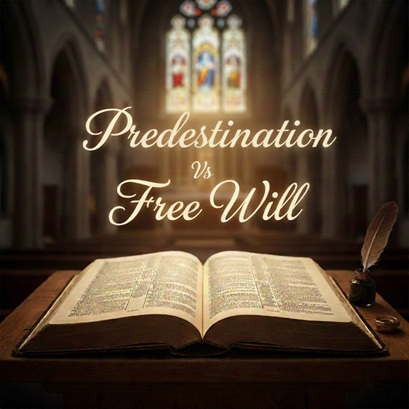This is one of the most debated theological questions in Christianity. The tension between God’s sovereignty in “election” and mankind’s “free choice” is a paradox.
The Bible clearly teaches both concepts, which is why the debate exists.
Here a a few passages that emphasize Predestination, Election, and God’s Sovereignty:
Ephesians 1:4-5: “He chose us in him before the foundation of the world, that we should be holy and blameless before him. In love he predestined us for adoption to himself as sons through Jesus Christ, according to the purpose of his will…”
Romans 8:29-30: “For those whom he foreknew he also predestined to be conformed to the image of his Son… And those whom he predestined he also called, and those whom he called he also justified, and those whom he justified he also glorified.”
John 15:16: “You did not choose me, but I chose you and appointed you that you should go and bear fruit…”
Here are a few passages that emphasize Free Choice: These texts suggest humans have a genuine choice to accept or reject salvation.
John 3:16: “For God so loved the world, that he gave his only Son, that whoever believes in him should not perish but have eternal life.”
Deuteronomy 30:19: “…I have set before you life and death, blessing and curse. Therefore choose life, that you and your offspring may live…”
Joshua 24:15: “…choose this day whom you will serve… But as for me and my house, we will serve the LORD.”
Revelation 22:17: “…And let the one who is thirsty come; let the one who desires take the water of life without price.”
Here are the primary ways Christian have attempted to explain how both can be true:
1. The Calvinist (Reformed) View: Sovereignty First
- God, before creation, chose specific individuals for salvation based entirely on His own gracious will, not because He foresaw they would believe. — This view holds that after the Fall, human will is not “free.” It is in “bondage to sin” and will always choose to reject God. – So, God’s “irresistible grace” works in the hearts of the elect, changing their very nature and desires. This causes them to willingly and freely choose to believe in Christ. It is a choice that is first enabled and secured by God’s sovereign regenerating work.
2. The Arminian (Wesleyan) View: Choice First
This view, named after theologian Jacobus Arminius, prioritizes human free will, which is made possible by God’s grace.
- God, using His foreknowledge, looked through time and “elected” those whom He foresaw would freely choose to believe in Christ. God’s election is conditional on the human choice He foresees. He graciously enables everyone to be able to choose, but the individual’s choice to believe is the decisive factor that activates their inclusion among the elect.
3. The Paradox (Antinomy) View
This perspective is held by many who find the other systems incomplete.
- The Bible fully teaches both truths. God is 100% sovereign in salvation, and humans are 100% responsible for their choice to believe. However, there is no way that the finite human mind can fully understand this. It is an “antinomy”—two truths that appear contradictory to us but are perfectly reconciled in the infinite mind of God. We are called to believe and live in the tension of both truths simultaneously.

